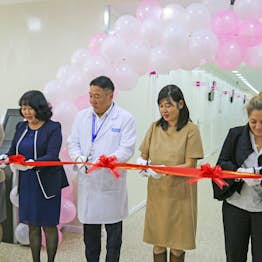Introduction
Since 2001, Luxembourg has been working in the health sector in Mongolia. This work has been gradually expanded to take in projects in the area of telemedicine in order to combat cardiovascular disease, which is currently the leading cause of death in the country. One specific component of the bilateral project currently in progress is the provision of in-service training by the Luxembourg cardiac surgery team from the National Institute for Interventional Cardiac Surgery and Cardiology (INCCI). Thus, in 2019, a symposium on cardiac imaging, for example, was successfully held for the first time in Ulaanbaatar, with 110 participants from 21 provinces in Mongolia. In parallel with thetelemedicine project in the cardiovascular sector, up to the end of September 2019 Luxembourg’s Development Cooperation also financed a telemedicine project for maternal and child health care services in cooperation with the United Nations Population Fund (UNFPA) and the progress made there will continue to be implemented by the government and the treating hospitals.
Read more
In line with this philosophy of national ownership, an emergency consultation system has been set up in the country’s 21 provincial hospitals that will enable provincial doctors and patients to dispense and obtain medical advice, in real time, remotely. Under the project, training materials and equipment were also delivered in 2019, so that the hospitals targeted may benefit from an environment and instruments that are in line with the pedagogical methods and new simulation technologies in the hospital environment, in order to boost the practical skills of their staff. Finally, the end-of-project evaluation conducted concluded that the actions it supported were very relevant in contributing to a reduction in maternal and child mortality and had also effectively contributed to capacity-building among national operators.
In addition to these health projects, Luxembourg’s Development Cooperation continued its support in the financial and banking area, through a training and capacity-building project in finance, and banking training programmes in collaboration with the ATTF/House of Training.
Priority areas of intervention
- Good health and well-being
Reference data
- Population: 3,225,167
- GNI (per resident): USD 3,780
- Human Development Index (HDI): 92/189
- Life expectancy: 70
- Indicative Cooperation Programme: project country
Key achievements 2019
- Establishment of a teleconsultation system linking together 21 provincial hospitals and the capital, Ulaanbaatar, enabling doctors in the provinces and patients to obtain medical advice remotely in real time from experts at the national centre for maternal and child health care: in 2019, 1,923 teleconsultations were delivered and 24 drilling units and emergency obstetric care (EmOC) simulation laboratories were fully operational (UNFPA project).
- Upgrading of facilities using new technologies (neonatal incubators, approximately 30% of surgeons now use non-invasive techniques) and new training methods (practical training in surgical skills, training simulation, e‑learning remote education platform).
- The project on the consolidation of cardiovascular services and the National Cardiac Centre in Mongolia has played a major role in the development of the national programme for preventing cardiovascular disease; the mortality rate from cardiovascular disease has fallen to 18 per 10,000 residents in 2019, compared with 24.3 in 2003.
- The cardiac surgery team at Shastin hospital performed 215 open-heart surgical procedures and 12 major vascular operations. 80% of these interventions were performed by Mongol surgeons.
- The MnCardio system, a telemedicine tool which is used to improve the management of cardiovascular disease, recorded 54,595 visits and registered 2,876 new patients. 843 admissions to hospital were monitored by the software, 192 cath lab procedures were recorded and 223 patient files were examined by the teleconsultation section.
